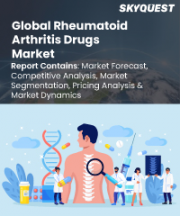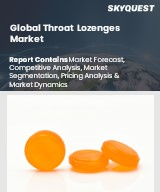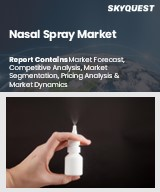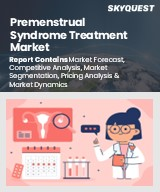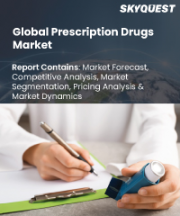
|
시장보고서
상품코드
1898081
처방약 시장 규모, 점유율, 성장 분석 : 제품 유형별, 치료 영역별, 투여 경로별, 최종 사용자별, 유통 채널별, 지역별 - 업계 예측(2026-2033년)Prescription Drugs Market Size, Share, and Growth Analysis, By Product Type (Generics, Orphan), By Therapy Area (Oncology, Immunology), By Route of Administration, By End-Users, By Distribution Channel, By Region - Industry Forecast 2026-2033 |
||||||
세계의 처방약 시장 규모는 2024년 1조 3,348억 7,000만 달러로 평가되었고, 2025년 1조 4,536억 7,000만 달러에서 2033년까지 2조 8,753억 4,000만 달러로 성장할 전망입니다. 예측 기간(2026-2033년)에 있어서 CAGR은 8.9%를 나타낼 것으로 예상됩니다.
세계의 처방약 시장은 의약품 지출 증가와 전문 치료에 대한 수요 급증을 배경으로 현저한 성장을 이루고 있습니다. 의사의 승인을 필요로 하는 처방약은 시판약에 비해 효과가 높기 때문에 점점 수요가 높아지고 있습니다. 만성질환과 희귀질환의 만연이 이 수요를 더욱 뒷받침하는 한편, 혁신적인 의약품 파이프라인의 충실은 시장 제공 강화를 약속하고 있습니다. 또한 노화가 진행됨에 따라 효과적인 의료 솔루션의 필요성이 더욱 커지고 있습니다. 북미는 여전히 주요 시장이지만 아시아태평양은 치료를 요구하는 대규모 인구층과 의료 인프라 개선에 대한 지속적인 투자를 배경으로 급속히 상승하고 있습니다. 이러한 요인들이 함께, 처방약 시장은 긍정적인 성장 궤도를 타고 있습니다.
세계의 처방약 시장 성장 촉진요인
세계 처방약 시장의 중요한 촉진요인은 선진국 시장, 특히 미국 등 지역에서 필수 의약품의 제네릭 의약품(후발 의약품)의 가용성 향상입니다. 이러한 제네릭 의약품은 브랜드 제품에 비해 상당히 저가이면서 동등한 효과를 유지하기 때문에 소비자의 지지가 높아지고 있습니다. 이러한 변화로 환자는 경제적 제약에 직면해도 중요한 치료를 받게 되어 결국 건강 상태의 개선으로 이어집니다. 게다가 신흥 시장의 나라와 효과적인 처방약상환제도가 없는 선진국의 국민도 이러한 대체품으로부터 큰 혜택을 받게 되어 세계 시장의 성장에 기여할 것으로 예측됩니다.
세계의 처방약 시장 성장 억제요인
암이나 심혈관 질환과 같은 심각한 건강 문제의 유병률이 특히 아프리카, 라틴아메리카, 아시아 등의 개발 도상 지역에서 증가하고 있음에도 불구하고, 세계 처방약 시장의 성장은 다양한 과제에 의해 크게 제한되고 있습니다. 시장 발전의 주요 장벽은 많은 처방약의 엄청난 가격 설정입니다. 이 경제적 부담은 접근을 제한하고, 일부 환자만이 이러한 약물을 구입할 수 있는 상황을 창출하고 있습니다. 그 결과 일부 처방 치료 비용은 10만 달러에서 50만 달러까지 늘어날 수 있으며, 종종 치료 불가능한 질병이라도 많은 환자들이 의료 요구와 관련된 심각한 경제적 어려움에 직면하고 있습니다.
세계의 처방약 시장 동향
세계의 처방약 시장에서는 주요 제약 기업에 의한 R&D 투자의 확대라는 현저한 동향을 볼 수 있습니다. 이 급증은 주로 만성 질환의 유병률 상승으로 인한 것으로, 미충족 임상 요구에 대응하는 혁신적인 치료법에 대한 환자 수요 증가로 이어집니다. 많은 만성 질환은 치료 과제를 갖고 있기 때문에 효과적이고 적극적인 치료법을 개발하기 위한 강력한 연구 노력이 진행되고 있습니다. 게다가, 희소질환용 의약품 개발에 대한 주목이 높아지고 있으며, 기업이 세계의 다양한 건강 과제에 임해, 환자의 치료 성과를 향상시키고자 하는 가운데, 시장의 확대를 더욱 추진하고 있습니다.
자주 묻는 질문
목차
서론
- 조사 목적
- 조사 범위
- 정의
조사 방법
- 정보 조달
- 2차 및 1차 데이터 수집 방법
- 시장 규모 예측
- 시장 가정 및 한계 사항
주요 요약
- 세계 시장 전망
- 공급과 수요 동향 분석
- 부문별 기회 분석
시장 역학과 전망
- 시장 규모
- 시장 역학
- 성장 촉진요인과 기회
- 성장 억제요인과 과제
- Porter's Five Forces 분석
주요 시장 인사이트
- 주요 성공 요인
- 경쟁도
- 주요 투자 기회
- 시장 생태계
- 시장의 매력 지수(2025년)
- PESTEL 분석
- 거시경제지표
- 밸류체인 분석
- 가격 분석
- 기술적 진보
- 규제 상황
- 이용 사례
세계의 처방약 시장 규모 : 제품 유형별&CAGR(2026-2033년)
- 제네릭 의약품
- 희귀질환 의약품
- 기타 처방약
세계의 처방약 시장 규모 : 치료 영역별&CAGR(2026-2033년)
- 종양학
- 면역학
- 안과
- 호흡기
- 피부과
- 위장관
- 비뇨기과
- 부인과
- 내분비학
- 기타
세계의 처방약 시장 규모 : 투여경로별&CAGR(2026-2033년)
- 경구
- 국소
- 비경구
- 기타
세계의 처방약 시장 규모 : 최종 사용자별&CAGR(2026-2033년)
- 병원
- 전문 클리닉
- 재택치료
- 기타
세계의 처방약 시장 규모 : 유통 채널별&CAGR(2026-2033년)
- 병원 약국
- 소매 약국
- 온라인 약국
- 기타
세계의 처방약 시장 규모&CAGR(2026-2033년)
- 북미
- 미국
- 캐나다
- 유럽
- 독일
- 스페인
- 프랑스
- 영국
- 이탈리아
- 기타 유럽
- 아시아태평양
- 중국
- 인도
- 일본
- 한국
- 기타 아시아태평양
- 라틴아메리카
- 브라질
- 기타 라틴아메리카
- 중동 및 아프리카
- GCC
- 남아프리카
- 기타 중동 및 아프리카
경쟁 정보
- 상위 5개사 비교
- 주요 기업의 시장 포지셔닝(2025년)
- 주요 시장 기업이 채용한 전략
- 최근 시장 동향
- 기업의 시장 점유율 분석(2025년)
- 주요 기업 프로파일
- 기업 상세 정보
- 제품 포트폴리오 분석
- 기업 부문별 점유율 분석
- 연간 매출 비교(2023-2025년)
주요 기업 프로파일
- Pfizer Inc.(미국)
- Johnson & Johnson(미국)
- Roche Holding AG(스위스)
- Merck & Co., Inc.(미국)
- AbbVie Inc.(미국)
- Novartis AG(스위스)
- Bristol-Myers Squibb Company(미국)
- Sanofi SA(프랑스)
- AstraZeneca plc(영국)
- GlaxoSmithKline plc(GSK)(영국)
- Eli Lilly and Company(미국)
- Gilead Sciences, Inc.(미국)
- Amgen Inc.(미국)
- Bayer AG(독일)
- Takeda Pharmaceutical Company Limited(일본)
- Novo Nordisk A/S(덴마크)
- Merck KGaA(독일)
- Biogen Inc.(미국)
- Teva Pharmaceutical Industries Ltd.(이스라엘)
결론과 권고
KTH 26.01.14Global Prescription Drugs Market size was valued at USD 1334.87 Billion in 2024 and is poised to grow from USD 1453.67 Billion in 2025 to USD 2875.34 Billion by 2033, growing at a CAGR of 8.9% during the forecast period (2026-2033).
The global prescription drug market is witnessing substantial growth, driven by rising pharmaceutical spending and a surge in the demand for specialized treatments. Prescription medications, which require a doctor's approval, are increasingly sought after due to their effectiveness compared to over-the-counter alternatives. The prevalence of chronic conditions and rare diseases is propelling this demand further, while a strong pipeline of innovative drugs promises to enhance market offerings. Additionally, the aging population amplifies the need for effective medical solutions. North America remains a key market player, yet the Asia-Pacific region emerges rapidly, fueled by a large treatment-seeking demographic and ongoing investments to improve healthcare infrastructure. These factors collectively set a positive trajectory for the prescription drugs market.
Top-down and bottom-up approaches were used to estimate and validate the size of the Global Prescription Drugs market and to estimate the size of various other dependent submarkets. The research methodology used to estimate the market size includes the following details: The key players in the market were identified through secondary research, and their market shares in the respective regions were determined through primary and secondary research. This entire procedure includes the study of the annual and financial reports of the top market players and extensive interviews for key insights from industry leaders such as CEOs, VPs, directors, and marketing executives. All percentage shares split, and breakdowns were determined using secondary sources and verified through Primary sources. All possible parameters that affect the markets covered in this research study have been accounted for, viewed in extensive detail, verified through primary research, and analyzed to get the final quantitative and qualitative data.
Global Prescription Drugs Market Segments Analysis
Global Prescription Drugs Market is segmented by Product Type, Therapy Area, Route of Administration, End-Users, Distribution Channel and region. Based on Product Type, the market is segmented into Generics, Orphan and Other Prescription Drugs. Based on Therapy Area, the market is segmented into Oncology, Immunology, Ophthalmology, Respiratory, Dermatology, Gastroenterology, Urology, Gynaecology, Endocrinology and Others. Based on Route of Administration, the market is segmented into Oral, Topical, Parenteral and Others. Based on End-Users, the market is segmented into Hospitals, Specialty Clinics, Homecare and Others. Based on Distribution Channel, the market is segmented into Hospital Pharmacy, Retail Pharmacy, Online Pharmacy and Others. Based on region, the market is segmented into North America, Europe, Asia Pacific, Latin America and Middle East & Africa.
Driver of the Global Prescription Drugs Market
A significant driver of the global prescription drugs market is the increasing availability of generic versions of essential medications in advanced markets, particularly in regions like the United States. These generic drugs are gaining traction among consumers due to their affordability, often costing significantly less than brand-name options while maintaining comparable efficacy. This shift allows patients to access vital treatments even when faced with financial constraints, ultimately leading to better health outcomes. Furthermore, individuals in emerging markets and those in developed countries without effective prescription drug reimbursement plans will benefit greatly from these alternatives, thereby contributing to growth in the global market.
Restraints in the Global Prescription Drugs Market
The growth of the global prescription drugs market is being significantly limited by various challenges, despite the increasing prevalence of critical health conditions such as cancer and cardiovascular diseases, particularly in developing regions like Africa, Latin America, and Asia. A primary hurdle to market advancement is the exorbitant pricing of many prescription drugs. This financial burden restricts access, resulting in only a small fraction of patients being able to afford these medications. Consequently, many individuals face substantial financial difficulties associated with their medical needs, as the costs for some prescription treatments can range between USD 100,000 and USD 500,000, even for conditions that often remain untreatable.
Market Trends of the Global Prescription Drugs Market
The global prescription drugs market is witnessing a significant trend characterized by heightened investments in research and development by leading pharmaceutical companies. This surge is largely driven by the escalating prevalence of chronic diseases, which has led to an increased patient demand for innovative therapies targeting unmet clinical needs. As many chronic conditions present challenges in treatment, robust research efforts are underway to create effective and aggressive therapies. Additionally, there is a growing emphasis on developing medications for rare diseases, further propelling market expansion as companies seek to address diverse health challenges and improve patient outcomes across the globe.
Table of Contents
Introduction
- Objectives of the Study
- Scope of the Report
- Definitions
Research Methodology
- Information Procurement
- Secondary & Primary Data Methods
- Market Size Estimation
- Market Assumptions & Limitations
Executive Summary
- Global Market Outlook
- Supply & Demand Trend Analysis
- Segmental Opportunity Analysis
Market Dynamics & Outlook
- Market Overview
- Market Size
- Market Dynamics
- Drivers & Opportunities
- Restraints & Challenges
- Porters Analysis
- Competitive rivalry
- Threat of substitute
- Bargaining power of buyers
- Threat of new entrants
- Bargaining power of suppliers
Key Market Insights
- Key Success Factors
- Degree of Competition
- Top Investment Pockets
- Market Ecosystem
- Market Attractiveness Index, 2025
- PESTEL Analysis
- Macro-Economic Indicators
- Value Chain Analysis
- Pricing Analysis
- Technological Advancement
- Regulatory Landscape
- Case Studies
Global Prescription Drugs Market Size by Product Type & CAGR (2026-2033)
- Market Overview
- Generics
- Orphan
- Other Prescription Drugs
Global Prescription Drugs Market Size by Therapy Area & CAGR (2026-2033)
- Market Overview
- Oncology
- Immunology
- Ophthalmology
- Respiratory
- Dermatology
- Gastroenterology
- Urology
- Gynaecology
- Endocrinology
- Others
Global Prescription Drugs Market Size by Route of Administration & CAGR (2026-2033)
- Market Overview
- Oral
- Topical
- Parenteral
- Others
Global Prescription Drugs Market Size by End-Users & CAGR (2026-2033)
- Market Overview
- Hospitals
- Specialty Clinics
- Homecare
- Others
Global Prescription Drugs Market Size by Distribution Channel & CAGR (2026-2033)
- Market Overview
- Hospital Pharmacy
- Retail Pharmacy
- Online Pharmacy
- Others
Global Prescription Drugs Market Size & CAGR (2026-2033)
- North America (Product Type, Therapy Area, Route of Administration, End-Users, Distribution Channel)
- US
- Canada
- Europe (Product Type, Therapy Area, Route of Administration, End-Users, Distribution Channel)
- Germany
- Spain
- France
- UK
- Italy
- Rest of Europe
- Asia Pacific (Product Type, Therapy Area, Route of Administration, End-Users, Distribution Channel)
- China
- India
- Japan
- South Korea
- Rest of Asia-Pacific
- Latin America (Product Type, Therapy Area, Route of Administration, End-Users, Distribution Channel)
- Brazil
- Rest of Latin America
- Middle East & Africa (Product Type, Therapy Area, Route of Administration, End-Users, Distribution Channel)
- GCC Countries
- South Africa
- Rest of Middle East & Africa
Competitive Intelligence
- Top 5 Player Comparison
- Market Positioning of Key Players, 2025
- Strategies Adopted by Key Market Players
- Recent Developments in the Market
- Company Market Share Analysis, 2025
- Company Profiles of All Key Players
- Company Details
- Product Portfolio Analysis
- Company's Segmental Share Analysis
- Revenue Y-O-Y Comparison (2023-2025)
Key Company Profiles
- Pfizer Inc. (United States)
- Company Overview
- Business Segment Overview
- Financial Updates
- Key Developments
- Johnson & Johnson (United States)
- Company Overview
- Business Segment Overview
- Financial Updates
- Key Developments
- Roche Holding AG (Switzerland)
- Company Overview
- Business Segment Overview
- Financial Updates
- Key Developments
- Merck & Co., Inc. (United States)
- Company Overview
- Business Segment Overview
- Financial Updates
- Key Developments
- AbbVie Inc. (United States)
- Company Overview
- Business Segment Overview
- Financial Updates
- Key Developments
- Novartis AG (Switzerland)
- Company Overview
- Business Segment Overview
- Financial Updates
- Key Developments
- Bristol-Myers Squibb Company (United States)
- Company Overview
- Business Segment Overview
- Financial Updates
- Key Developments
- Sanofi S.A. (France)
- Company Overview
- Business Segment Overview
- Financial Updates
- Key Developments
- AstraZeneca plc (United Kingdom)
- Company Overview
- Business Segment Overview
- Financial Updates
- Key Developments
- GlaxoSmithKline plc (GSK) (United Kingdom)
- Company Overview
- Business Segment Overview
- Financial Updates
- Key Developments
- Eli Lilly and Company (United States)
- Company Overview
- Business Segment Overview
- Financial Updates
- Key Developments
- Gilead Sciences, Inc. (United States)
- Company Overview
- Business Segment Overview
- Financial Updates
- Key Developments
- Amgen Inc. (United States)
- Company Overview
- Business Segment Overview
- Financial Updates
- Key Developments
- Bayer AG (Germany)
- Company Overview
- Business Segment Overview
- Financial Updates
- Key Developments
- Takeda Pharmaceutical Company Limited (Japan)
- Company Overview
- Business Segment Overview
- Financial Updates
- Key Developments
- Novo Nordisk A/S (Denmark)
- Company Overview
- Business Segment Overview
- Financial Updates
- Key Developments
- Merck KGaA (Germany)
- Company Overview
- Business Segment Overview
- Financial Updates
- Key Developments
- Biogen Inc. (United States)
- Company Overview
- Business Segment Overview
- Financial Updates
- Key Developments
- Teva Pharmaceutical Industries Ltd. (Israel)
- Company Overview
- Business Segment Overview
- Financial Updates
- Key Developments






